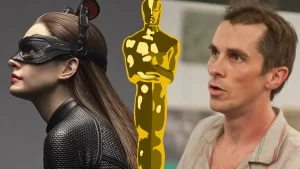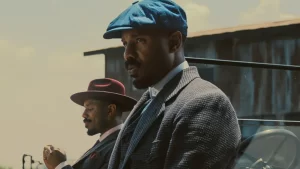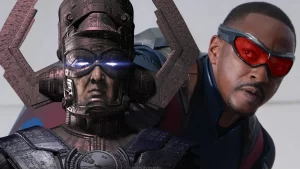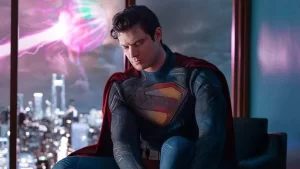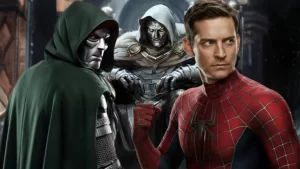Facsimile of History
[Continuing our 2015 Academy Award Roundup]
A Film Review of The Imitation Game
Welcome back ladies and gentlemen to another World War II dramatic period piece because 1) why not? 2) it is always difficult to ignore during award season and 3) The number of brilliant individuals whose singular contributions to this highly romanticized global conflict is seemingly endless as their tales continue to enter the mainstream. I have an admitted fatigue with WW II films because they’ve become just as predictable as zombie films, are more concerned with glorifying heroism (and violence) than anything else and between movies, TV and video games; I’m just sick and tired of seeing Nazis in any capacity. Enter The Imitation Game, a film that tells a story of British mathematician Alan Turing who invented a machine that broke Nazi Germany’s Enigma codes which was instrumental in turning the tide in the Allies’ favor in the European Theatre. Unlike American Sniper, this is not a war film that takes the audience to the front lines, but rather gives us a glimpse into the technical and strategic think tanks that have essentially made the evolution of war infinitely more efficient in its brutality than the use of sticks and stones. Expect lots of dialogue, a minimum of action and a healthy regimen of expert acting.
One more thing to expect is a significant amount of criticism regarding the “facts” of this film and the manner in which they are portrayed. Quite frankly, historians are foaming at the mouth to bite into the multitude of inaccuracies made for the purpose of enhanced drama and I am shocked, SHOCKED, to learn of this scandalous situation. Actually, I am not. I would like to think that those who frequent the cinema often enough would be aware of the truth regarding “reel” history, but for those who accept everything they see and hear as the absolute truth, let me make this abundantly clear. Film adaptations (Hollywood or otherwise) are works of fiction. They are not documentaries which are indeed works of non-fiction and should therefore be viewed as entertainment first and secondly, as an invitation to research actual recorded history should the story peak one’s interest.
Although The Imitation Game credits biographer Andrew Hodges’ book “Alan Turing: The Enigma” as the basis for its screen story, this film has no interest in simply recreating a series of bullet points in Turing’s life. Even if the creative license at work by director Morten Tyldum and screenwriter Graham Moore has been stretched beyond acceptable limits, it is still a work of fiction. Perhaps critics are frustrated that the possible slander of Turing’s legacy, as suggested by moments in the film, is the lasting impression that will be absorbed into the global culture’s zeitgeist. My suggestion is that if this film’s offenses are that outrageous, and then address the situation with a documentary that calls out the inaccuracies by concerning itself with being educational about the facts. Sniping at it from the academic pulpit without something more productive behind the criticism will be met with apathy and that’s usually the way any controversy regarding the entertainment industry’s mucking up of history plays out.
Thus, accepting this screen story as fiction, The Imitation Game gradually unveils its true message through a series of flashbacks in Alan Turing’s life that most frequently visits his active Enigma work at Bletchley Park. Brought up to be a intellectual from boyhood, Turing’s apparent weakness as a human being turns out to be social interaction and as often as this story highlights the tragic effects of his personality quirks, it also provides moments of genuine comedy which forced me to laugh out loud in the theatre on more than one occasion. The interesting aspect of this story is that although it is primarily concerned with the human effort put into cracking Enigma, it does have secondary and tertiary agendas at work. As the story progresses, we realize that it has much more to do with Turing’s personal life, the moments that shaped it and the possible reasons for his rabid desire to do what most deemed impossible outside of surviving and ultimately winning the war against Nazi Germany.
The story’s perspective also flashes forward periodically to Turing’s life post WW II and the police investigation regarding his personal affairs. These moments are amongst the most contentious for the historians and a bit for me due to the aforementioned third agenda regarding sexuality that seemed to come out of nowhere. The final moments of this film are literally spelled out for the audience via superimposed text which explains the aftermath of Turing’s death. Because the previous ¾ of the film had not been actively pursuing this angle in Turing’s life beyond mild hinting, this dénouement felt a bit awkward in how it was shoehorned in considering the seriousness of its message. This last minute curveball dilutes the message of tolerance and I wonder if this film would have been better served had these moments were cut all together. Tolerating Alan Turing as a character was framed within the concept of him being an intellectual elitist and an impersonal narcissist. His redemption was a genuine ignorance of other people’s feelings and opinions and the effort he made to bridge the gap of understanding (much like the effort that was not reciprocated to him by British society at the time).
This film is an entirely dialogue driven drama and one of its weaknesses is its ability to connect the film’s most interesting moments (anything involving Turing at Bletchley) to the devastation of WW II. There are a couple of action scenes that show subs, ships and tanks at various fronts, but they are very short vignettes to remind the viewer that a war is in fact going on, but it isn’t lasting and not particularly satisfying for action junkies. There is also one scene that shows Turing himself riding a bicycle through a recently bombed part of a city, but again this plays the role of one of those “reminder” scenes. Playing the balancing game between action and dialogue scenes is never an easy task, but at the end of the day, the editor can only mix in whatever footage has been captured (or CG generated) in the first place. In the case of this film the only reliable change in tempo or scenery throughout are the flashes to the different points in Turing’s life.
An excellent cast was assembled to support the protagonist in this story as contributions from Mark Strong, Charles Dance, Matthew Goode and Keira Knightley deliver respectable performances, but such is to be expected from these veterans. This film (like American Sniper and The Theory of Everything) is one that ultimately boils down to one performance and its singular journey; namely Benedict Cumberbatch as Alan Turing. If you missed him in Star Trek Into Darkness or the Sherlock TV series, The Imitation Game is an excellent opportunity to see this actor produce an absolute tour de force when it comes to dramatic acting for the silver screen. As an introvert, Turing isn’t a particularly interesting character, but then he is forced to work with his colleagues and Cumberbatch revs up his awkward charm and sharp comedic timing. The regal nature of his baritone voice easily establishes and maintains Turing’s intellectual domination in every scene. However, where Cumberbatch truly shines is in every scene where Turing meets with heartbreaking failure, frustration or defeat. Cumberbatch takes every ounce of negative energy to heart and channels his reaction so personally that the audience feels it in every tear he sheds. Those believing Benedict Cumberbatch to be nothing more than a character actor with robotic tendencies are in for a rude awakening upon the screening of this film.
Few WW II films have shown less combat scenes during its runtime than The Imitation Game, but fewer have shown the little people behind the scenes that developed the technology, research and strategy that was clearly the difference between victory and defeat. The code breakers at Bletchley may not have spilled blood on the battlefield, laid waste to an enemy platoon with a machine gun or piloted a single bomber into the heart of the enemy stronghold, but their efforts and Turing’s in particular, saved England. Despite some of the historical inaccuracies, I found this film to be entertaining enough at telling aspects of Turing’s life. The production could certainly have benefitted from more focus in its narrative, but it remains to be seen how much the audience will care when Benedict Cumberbatch’s performance resonates so profoundly. However, when you factor in the historic faux pas and the multitude of hidden messages that are heavily back loaded towards the film’s final act, I couldn’t say that this film has a realistic chance at winning Best Picture. It is a good film that deserves the viewer’s consideration for the outstanding performance of Benedict Cumberbatch.


